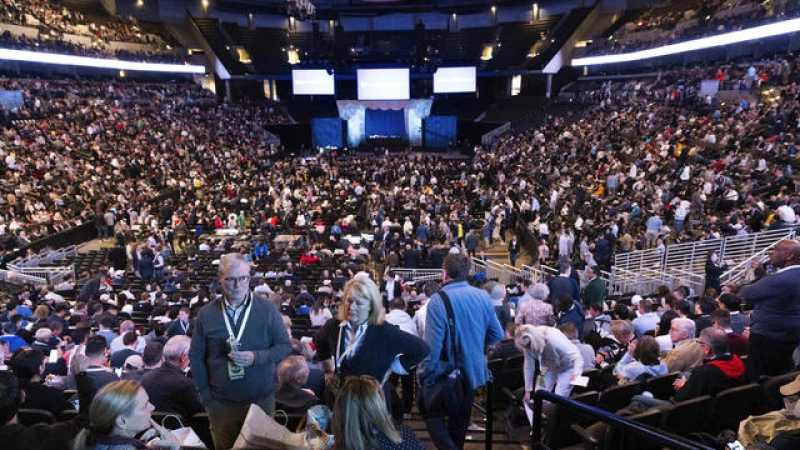Warren Buffett's Berkshire Hathaway gathered for its first annual meeting in an Omaha arena on Saturday, bringing together shareholders for the first time since the death of longtime vice chairman and right-hand man Charlie Munger.
Tens of thousands of shareholders filled the arena eager to vacuum up tidbits of wisdom from billionaire Buffett, who famously dubbed the meeting "Woodstock for Capitalists" and to pay tribute to Munger, who died at 99 in November.
The meeting opened with a video tribute to Munger recounting his life and highlighting some of his best known quotes from the meetings over the years that drew applause, including classic lines like "If people weren't so often wrong, we wouldn't be so rich." The video also featured old interviews with Buffett and Munger talking about their epic friendship.
The video also featured several of the classic skits the investors made for meetings over the years with holiday stars like a "Desperate Housewives" spoof where one of the women introduced Munger as her boyfriend and another video where Jamie Lee Curtis swooned over Munger.
As the curtains closed, the audience erupted into a thunderous applause, honoring Munger for his role as what Buffett described as "the mastermind behind Berkshire Hathaway."
For years, Munger stood alongside Buffett at the annual Q&A session, where the two would field questions for hours on end. While Buffett would elaborate on topics at length, Munger would deliver sharp, concise responses that cut straight to the chase. His memorable moments include dismissing cryptocurrencies, advising people to choose their partners wisely, and likening certain internet ventures in the early 2000s to "turds."
The dynamic between Munger and Buffett resembled that of a classic comedy duo, with Buffett setting the stage for Munger's quick-witted punchlines. Together, they steered Berkshire Hathaway from a struggling textile business to a diverse conglomerate encompassing insurance giants like Geico, the BNSF railway, various utilities, and a range of other enterprises.
Munger often attributed Berkshire's prosperity to the simple principle of "avoiding stupidity" rather than striving for brilliance. Their strategy centered on investing in industries they comprehended thoroughly, a philosophy that underpinned their long-term success.
"Warren always did at least 80% of the talking. But Charlie was a great foil," said Stansberry Research analyst Whitney Tilson, who was looking forward to his 27th consecutive meeting with a bit of a heavy heart because of Munger's absence.
That absence, however, may well create space for shareholders to get to know better the two executives who directly oversee Berkshire's companies: Ajit Jain, who manages the insurance units, and Greg Abel, who handles everything else. Abel will one day replace the 93-year-old Buffett as CEO. Abel and Jain are sharing the main stage with Buffett for the first time this year in the spot Munger used to occupy.
The first time Buffett kicked a question to Abel, he mistakenly said "Charlie?" out of habit.
Morningstar analyst Greggory Warren said he hopes Abel will speak up more this year and let shareholders see some of the brilliance Berkshire executives talk about. Ever since Munger let it slip at the annual meeting three years ago that Abel would be the successor, Buffett has repeatedly reassured investors that he's confident in the pick.
Berkshire Hathaway remains successful amid drop in earnings
But those figures were heavily swayed by a large drop in the paper value of Berkshire's investments. That's why Buffett encourages investors to pay more attention to the conglomerate's operating earnings that exclude the investment figures. By that measure, Berkshire's operating earnings jumped 39% to $11.222 billion from last year's $8.065 billion as its insurance companies led a strong performance.
The three analysts surveyed by FactSet Research had predicted operating earnings of $6,701.87 per Class A share.
Buffett did sell off nearly $6 billion in stocks during the quarter, including trimming about 13% of Berkshire's massive Apple stake. The investment in the iPhone maker is still the biggest one in the $364 billion portfolio at $135.4 billion, and Buffett said he expects Apple to remain the biggest investment for years — even up to when his successor takes over.
But the estimated value of Berkshire's Apple stake suggests that Buffett sold off more than 100 million shares. Buffett has said he invested in Apple's stock because of how devoted consumers are to the iPhone and other Apple products.
During the Berkshire meeting, Apple CEO Tim Cook shared with CNBC his gratitude for having Berkshire as a major shareholder and confirmed his awareness of the sales prior to Berkshire's disclosure. BNSF railroad's profits saw an 8% decline to $1.143 billion, but the majority of its other companies posted strong results. The utility unit experienced a significant 72% increase in operating profits, contributing $717 million to Berkshire's overall performance.
Despite the absence of significant acquisitions on the horizon, Berkshire's cash reserves reached a new high of $188.993 billion in the quarter. The conglomerate allocated $2.6 billion towards share repurchases in the first three months of the year. With holdings in Geico insurance, BNSF railroad, various major utilities, and numerous other entities, Berkshire continues to generate substantial profits.
"We are eager to deploy our capital, but we will only do so in ventures that offer high returns with minimal risk," stated Warren Buffett.







